Interdisciplinary Brain Activities
Over the last few years, the CNLM has partnered with several campus organizations to bring interdisciplinary brain activities to faculty and students at UCI. Below are some examples of these activities:
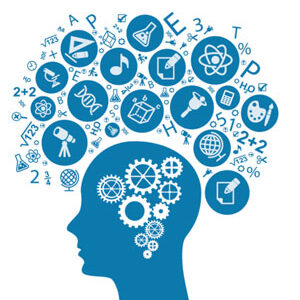
Joint Symposium: Physical Exercise and Brain Health
In partnership with the UCI Exercise Medicine and Sport Sciences Initiative (EMSSI)
March 2, 2017
Arnold and Mabel Beckman Center of the National Academies of Sciences and Engineering
Virtually every organism is dependent on movement. Regular physical activity imposes unique stresses on a broad spectrum of cell types, tissues, and organ systems. In so doing, exercise plays a key role in shaping fundamental biological processes necessary for maintaining health and preventing disease. In contrast, inactivity and a sedentary lifestyle are widely recognized as a significant factor in the development of a wide array of diseases and disabilities including brain disease. The effective role of exercise to improve brain health and to alter brain disease trajectories is gaining acceptance among health care professionals. However, a complete mechanistic understanding of how regular physical activity works to alter brain function and health remains a mystery. The Physical Exercise and Brain Health symposium brings together renowned scholars to share discoveries on the impact of exercise on brain health and disease and discuss the state of the field and path forward.
Co-hosts:
- Michael A. Yassa, Ph.D., Director, Center for the Neurobiology of Learning and Memory
- James Hicks, Ph.D., Director, Exercise Medicine and Sport Sciences Initiative
Keynote Lecture by Arthur Kramer, Ph.D., University of Illinois. The symposium also included a poster session, as well as an evening community lecture by Dr. Wendy Suzuki.
Speakers:
- Erik Erickson, Ph.D., University of Pittsburgh.
- Michelle Carlson, M.D., Johns Hopkins School of Public Health.
- Mark Mattson, Ph.D., Intramural Research Program, National Institute on Aging.
- Henriette van Praag, Ph.D., Intramural Program, National Institute on Aging.
- Laura Baker, Ph.D., Wake Forest School of Medicine, Winston-Salem
- Carl Cotman, Ph.D., University of California, Irvine
- Wendy Suzuki, Ph.D., New York University
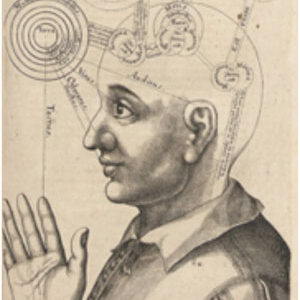
Joint Symposium: Memory and Meaning
In partnership with the Humanities Commons, School of Humanities
April 28-29, 2017
Herklotz Conference Facility
Memory transcends individuals, time, and disciplines. The study of memory is deeply rooted in ancient tradition and has evolved over centuries to include diverse methodologies and interpretive approaches. In Memory and Meaning, UCI scholars join from over a dozen departments in humanities, arts, sciences, medicine, business, and law to share and discuss their views of memory. They address questions such as how humans, individually and collectively, form and retrieve memories, remember themselves and their communities, tell stories about their past, and imagine their future.
Program Committee:
Sven Bernecker (Philosophy), Rebeca Helfer (English), Zina Giannopoulou (Classics), Michael Yassa (Neurobiology and Behavior)
Friday, 4/28
Session #1: Forgetting and Remembering:
- James McGaugh (Neurobiology and Behavior), Making Lasting Memories
- Mark Mapstone (Medicine, Neurology), Learning from Success: Metabolomic Insights for Cognitive Aging
- Georg F. Striedter (Neurobiology and Behavior), The Evolutionary Emergence of Memory for Places and Individuals
- Session #2: Forgetting and Remembering:
- Craig Stark (Neurobiology and Behavior), The Adaptive Nature of Memory’s Imperfections
- Sven Bernecker (Philosophy), Epistemic Benefits of Memory’s Imperfections
- Peter Krapp (Film and Media Studies), Media and Forgetting
Session #3: Truth and Fiction:
- Elizabeth Loftus (Psychology and Social Behavior, Law), The Fiction of Memory
- Erika Hayasaki, Barry Siegel (English, Literary Journalism), The Role of Episodic Memory in Journalism
- Jonathan Alexander, Antoinette LaFarge (English, Art), Imagined Memories, Creative & Critical
Session #4: Truth and Fiction:
- Linda Levine (Psychology and Social Behavior), Bias in Predicted and Remembered Emotion: Recalculating When and Why Our Mental GPS Goes Awry
- Mark Steyvers (Cognitive Science), Reconstruction from Memory in Naturalistic Environments – a Bayesian Cognitive Modeling Perspective
- Loraine Lau-Gesk (Business), Retrospective Evaluations of Experiential Memories
Saturday, 4/29
Session #1: Time and Narrative:
- Rebeca Helfer (English), The Art of Memory
- Geoff Bowker (Informatics), Memory and the Future in the Age of Big Data
- Kai Evers (European Languages and Studies), Remembering Futures of the Past: On Recovering the Anticipation of Multiple Futures in Modernist Literature
Session #2: Time and Narrative:
- Zina Giannopoulou (Classics), Memory, Sensation, and Meaning in Theo Angelopoulos’ Ulysses’ Gaze
- Sarah Farmer (History), Landscape and Memory in the Visual Memoir of Photographer Raymond Depardon
- Angela Lukowski (Psychology and Social Behavior), Examining the Intergenerational Transmission of Narrative Style in Chinese and European American Young Adults Born and Raised in the United States
Session #3: Action and Performance:
- Andromache Karanika (Classics), A Bride’s Trauma and a Bard’s Performance of Memory in Ancient Greek Poetry
- Anthony Kubiak (Drama), Lineage, Ancestors, and Shamanic Constellations: Performance as Memory
- Michael Lee (Cognitive Science) and William Shankle (Medical Care Corporation & Hoag Neurosciences Institute), Applying Cognitive Models to Behavioral Memory Tests
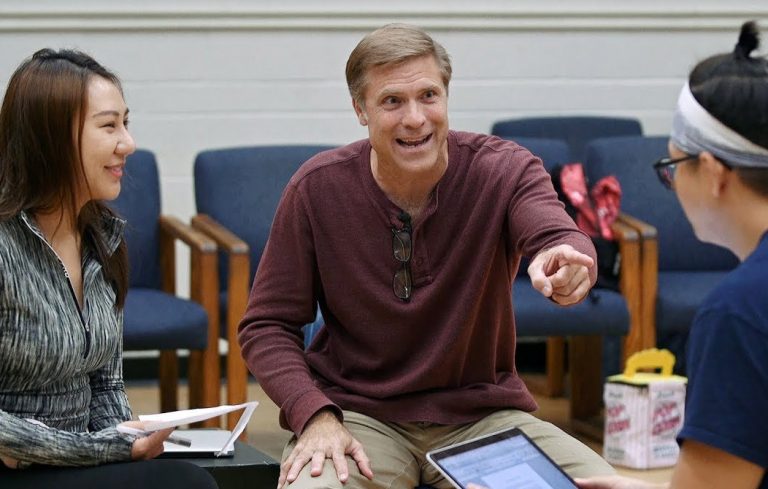
Joint Course: The Science of Acting (Drama 135)
In partnership with the Claire Trevor School of the Arts
Fall 2017
The CNLM and the Claire Trevor School of the Arts formed a partnership in the fall of 2017 to create a new cross-disciplinary course to explore the role of neurobiology in performing arts.
The class featured weekly lectures by faculty fellows of UCI’s Center for the Neurobiology of Learning & Memory, including world-class neuroscientists James McGaugh, Gregory Hickok, Elizabeth Loftus, and Michael Yassa. They addressed topics such as how to efficiently “create” memories for characters, how characters would realistically respond to onstage stimuli based on these memories and how to manipulate emotions physiologically – for instance, hanging the head and starting to cry. McGaugh, who minored in drama in college, has studied the neurobiology of learning and memory for more than 60 years. He compares Ihrig’s technique to absorbing the meaning of a song before singing the words – it enriches the experience for both singer and audience. The students put the advice into practice, doing exercises each week designed to apply neurological principles to characters onstage and reverse-engineer human behavior. They spout monologues at each other, craft perfect facial expressions and come up with plausible memories for their dramatic personas. At the end of the course, as a final exam, the students will write and act their own roles, animated with memories and emotions they have invented, in hopes that their performances will exhibit greater depth and honesty.
As one of the most innovative new courses at UCI, it has attracted substantial media attention including news coverage by venues including coverage on the front page of the UCI website as well as the main page of the website for the University of California, and news articles written by the Orange County Register and the Los Angeles Times. The course has significantly enriched the learning experience both for the faculty instructors and for the students. We are now expanding this course into a full curriculum through the Division of Continuing Education to cater to professional actors and other professionals who can benefit from learning how to create immersive experiences. The CNLM is now collaborating with the Division of Continuing Education to build a new “Actor’s Laboratory” for assessment of physiological parameters associated with performance and create novel ways by which these responses can be optimized or enhanced.
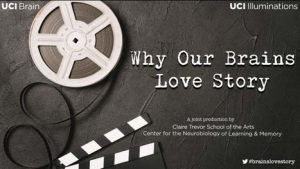
Joint Program: Why Our Brains Love Story
In partnership with the Claire Trevor School of the Arts and UCI Illuminations
November 13, 2018
Herklotz Conference Facility
Why our brains love story is a two-part series to better understand a naturalistic and scientific perspective on storytelling. People tend to believe that watching their favorite television series is a way to escape, ‘zone out,’ and relax, but is there more going on in the brain? An ongoing collaboration between the Center for the Neurobiology of Learning and Memory (CNLM) and the Claire Trevor School of the Arts (CTSA) is exploring why we love to sit down with a good book or movie. Part one of the series is entitled Scientific Story Shaping. This first of its kind experimental workshop will bring together a successful Hollywood Producer, a Hollywood story consultant, a neuroscientist, a drama instructor and an audience to brainstorm the first ever Neuroscientifically designed one act play! Part two of the series is planned for the fall of 2019.
Expert Panelists:
- Adam Leipzig, CEO of Entertainment Media Partners
- Lisa Cron, Story Consultant and author of Wired for Story
- David Ihrig, Drama Coach and Instructor of “The Science of Acting”
- Michael Yassa, Neuroscientist and memory expert

Neuro-Art Symposium
In partnership with the Claire Trevor School of the Arts, Institute for 21st Century Creativity, Susan Samueli Institute for Integrative Health; Africana Institute for Creativity Recognition and Elevation; Pediatric Exercise and Genomics Research Center, and Center for Integrative Movement Sciences, Chancellor’s Illuminations, Office of the Vice Chancellor for Research and the Office of Inclusive Excellence.
December 2, 2021
Virtual Event
Embodiology®: From Ancestral Movement-Music Practices to Phenomenal Being
Professors S. Ama Wray and Mike Yassa are joined by an interdisciplinary, cross-cultural, and multimodal group of researchers to explore how ancestral embodied wisdom is shaping human communication.
Most analyses of art, for the purposes of advancing neuroscience and medicine, have been pursued through prisms of western practices. Join us as we explore how Dr. S. Ama Wray has been translating Africana ‘bodily ways of knowing’ through her autoethnographic action research in Kopeyia Village, Ghana, generating virtuosic as well as community artmaking through the social technology which she defines as Embodiology®. She is joined by an interdisciplinary and intercultural group of scientists, medical doctors, and researchers to look at how the application of this embodied wisdom is shaping human communication.
Join campus leaders and students for this unique inquiry which is opening a new research paradigm where interculturality matters.
Campus Researchers:
Ama Wray, PhD and Michael A. Yassa, PhD
Visiting Researchers:
Dele Olajide, MD, PhD,
Carol Penn, D.O, ABOM, FACOFP
Richie Davidson, PhD
Elikem Nyamuame, PhD
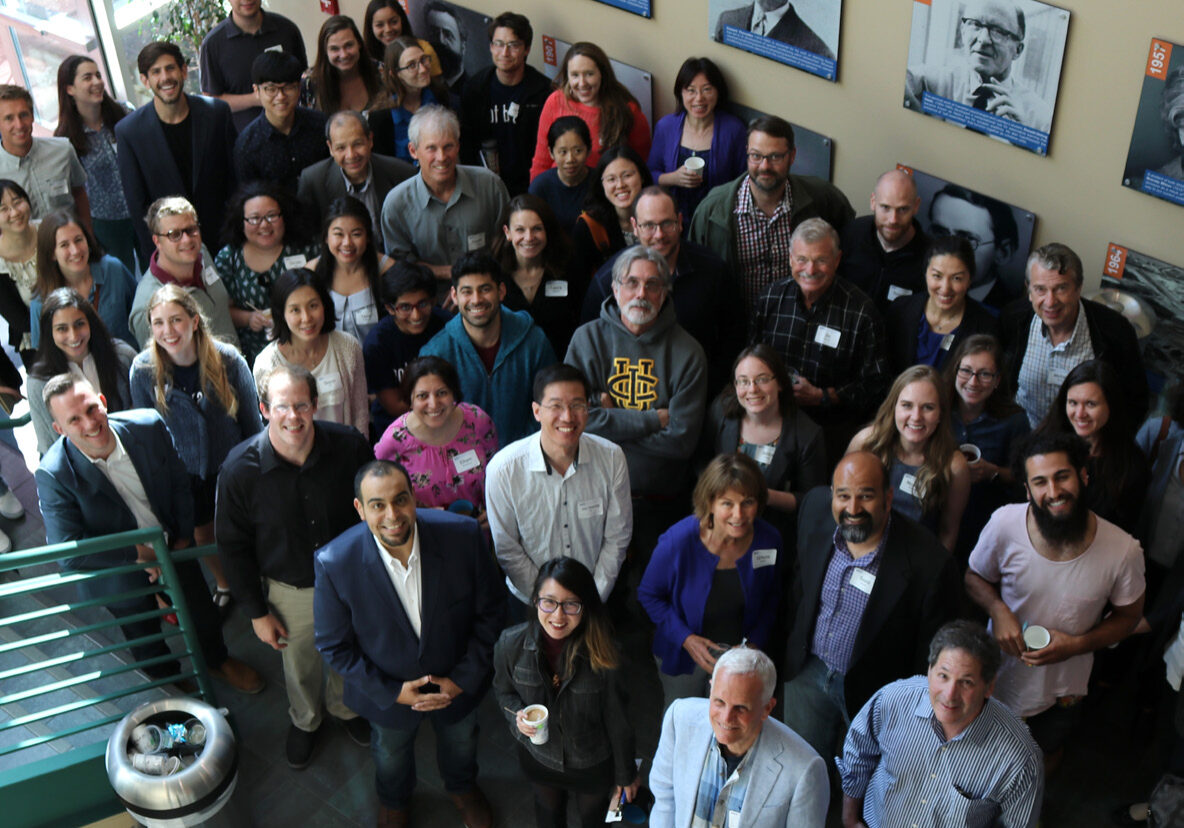
Joint Colloquia
The CNLM frequently co-sponsors and co-hosts colloquia
The CNLM frequently co-sponsors and co-hosts colloquia and seminars with parnters on campus including the departments of Neurobiology and Behavior, Anatomy and Neurobiology, and Psychiatry and Human Behavior, as well as campus units including the Epilepsy Research Center, the Conte Center @ UCI, and the Medical Scientist Training Program. Below are some recent representative examples.
Tuesday January 22, 2019 - 4:00PM
Rebecca Shansky, Ph.D.
Associate Professor, Department of Psychology, Northeastern University
Sex differences in fear processing
* co-hosted with the Conte Center @ UCI
Monday January 8, 2018 - 4PM
Loren Frank, Ph.D.
Professor, HHMI, Kavli Institute for Fundamental Neuroscience, UCSF
Neural substrates of memories and decisions
*co-hosted with the MSTP and the Department of Anatomy and Neurobiology
Friday December 8, 2017 - 11AM
Fabio Ferrarelli, M.D., Ph.D.
Assistant Professor in Psychiatry, University of Pittsburgh
Sleep spindle deficits in schizophrenia: when do they start?
* co-hosted with the Department of Psychiatry and Human Behavior
Tuesday, October 11, 2016 - 11AM
Bryce Mander, Ph.D.
Postdoctoral Fellow in Neuroscience, University of California, Berkeley
Neural correlates of age-related disruption of sleep oscillation expression and sleep-dependent memory
* co-hosted with Department of Psychiatry and Human Behavior
